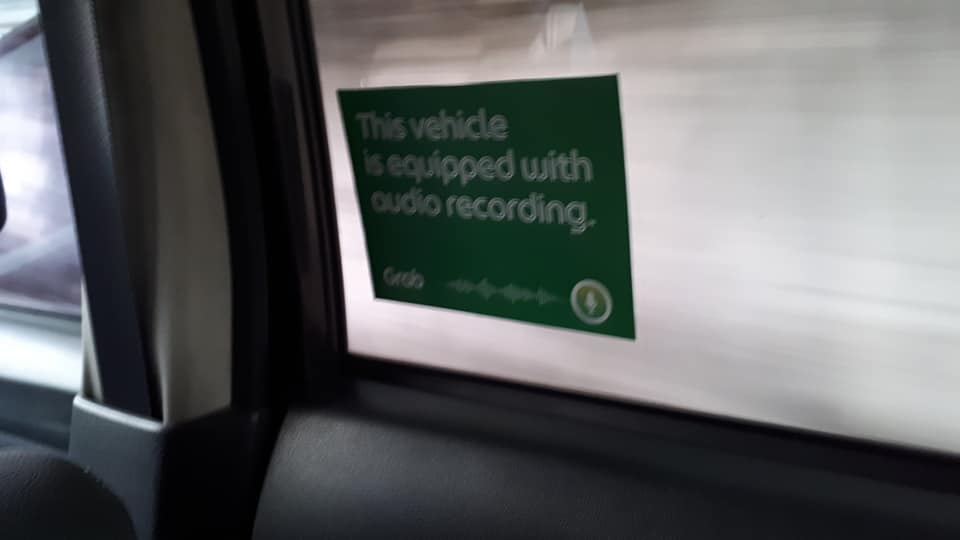A Facebook post making the rounds has raised the hackles of a number of Grab riders.
“Why is this possible without my explicit content?” wondered Ana Margarita Sanchez as she posted images from her ride yesterday (January 12), “I can actually sue you, Grab.”

Dangling behind her Grab driver’s seat was a green card with the text:
Notice. As part of a trial program, this car is equipped with audio recording (capability).
How will the audio be recorded? Audio recording functionality is built into the driver’s app. The encrypted file will be sent directly to Grab servers.
How will the audio recording help me? In the unlikely event of an incident, audio recordings may be used to protect you and the driver.
Who has access to the files? The encrypted file is stored on Grab servers for a short period of time, and will not be shared with your driver or other third parties.
On the photo of the same card that Sanchez shared, I spied a QR code where the rider can purportedly learn more. I tried out the code but it returned a “404 Page not found” error (I checked it again today, January 13, but still nothing). Meanwhile, a sticker on the right passenger window again declares, “This vehicle is equipped with audio recording.” At least you can’t fault them for hiding this capability.
But wait, what gives?
Sought for an explanation by members of the media, Grab Philippines released a statement and entitled it “Re: Pilot run of in-car audio and video recording.”
The ride-hailing service said it “will be conducting a small pilot study in Metro Manila to assess the effectiveness of in-car audio and video recording in incident prevention and dispute resolution. The pilot study starts on 13 January and will run for 2-6 weeks with over 180 GrabCar vehicles, of which half will be equipped with in-car cameras and the rest with audio-recording capabilities.”
The audio recording will commence when the driver presses the pick-up button and stops when “drop off” is pressed. The video recording, on the other hand, will be recording the whole time the driver is online.
If you happen to book any one of its 180-plus cars equipped with the audio/video recording capability, Grab says you will be informed through GrabChat about it. More importantly, you have “the option to cancel the booking without any penalty.”
AUDIO AND/OR VIDEO
Aside from making an audio recording, video (apparently including in-car footage) will also be captured. Grab assures that “audio and video recordings will be encrypted and stored securely in Grab’s database for 7 days and 10 hours respectively.”
Who accesses the recordings? “Authorized Grab representatives for investigation purposes in the unlikely event of an incident.” So, it’s akin to an airplane’s black box then?
“Grab sees that this audio and video recording pilot will serve as another layer of security to both drivers and passengers. We hope that this pilot, if proven successful, will bring us even closer to our goal of zero preventable incident on our platform,” closes the statement.
PRIVACY KILLER?
Sought for comment, Sanchez rued to WHEELS.PH on Messenger, “I felt completely uncomfortable. But what was I going to do? Tell him mid-ride…ah, stop the car? Single-mom challenges are challenges… getting a ride in Manila as you know is not always easy.” She had her seven-year-old son with her.
When told the program consisted of taking video as well, Sanchez was even more distressed, “You do a lot of private things in a car, generally, like put on your makeup, make personal calls.”
On the whole, she is not pleased with Grab. “There should really be competition to Grab because they have a monopoly and free play area it seems for anything they want to do.” The mom also vented her opinion about the Land Transportation Franchising and Regulatory Board (LTFRB): “(It) has to get its act straightened out. They are lousy regulators.”
DRIVER JUMPED THE GUN
Back to the January 12 ride in question, Grab insists that, despite the installed signs, “no recording happened, as the pilot will only start (January 13).” It was simply a case of an overeager driver-partner putting up the in-car merchandise ahead of the pilot program. “We will reach out to the driver to re-educate and call (the) passenger as well.”
When asked if both the National Privacy Commission (NPC) and the Land Transportation Franchising and Regulatory Board (LTFRB) have been advised of the program, Grab Philippines replied on its Viber group thread with members of the media: “The pilot is compliant with NPC’s data privacy law… There is no jurisdiction that restricts us from putting up safety measures for the benefit of our drivers and passengers. But rest assured that the LTFRB will be notified accordingly.”
The matter was brought to the LTFRB’s attention by members of the media, and we will definitely update this article once we hear what the agency thinks about it.
In the meantime, stay safe, everyone.

